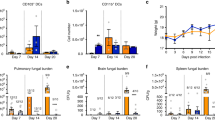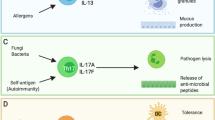Abstract
We have investigated whether dendritic cells genetically modified to express CD40 ligand and pulsed with antigen can trigger B cells to produce antigen-specific antibodies without CD4+ T-cell help. Dendritic cells modified with a recombinant adenovirus vector to express CD40 ligand and pulsed with heat-killed Pseudomonas induced naive B cells to produce antibodies against Pseudomonas in the absence of CD4+ T cells in vitro, initiated Pseudomonas-specific humoral immune responses in vivo in wild-type and CD4−/− mice, and protected immunized wild-type and CD4−/−, but not B-cell−/− mice, from lethal intrapulmonary challenge with Pseudomonas. Thus, genetic modification of dendritic cells with CD40 ligand enables them to present a complex mixture of microbial antigens and establish CD4+ T cell-independent, B cell-mediated protective immunity against a specific microbe.
This is a preview of subscription content, access via your institution
Access options
Subscribe to this journal
Receive 12 print issues and online access
$209.00 per year
only $17.42 per issue
Buy this article
- Purchase on Springer Link
- Instant access to full article PDF
Prices may be subject to local taxes which are calculated during checkout






Similar content being viewed by others
References
Banchereau, J. & Steinman, R.M. Dendritic cells and the control of immunity. Nature 392, 245–252 (1998).
Grewal, I.S. & Flavell, R.A. CD40 and CD154 in cell-mediated immunity. Annu. Rev. Immunol. 16, 111–135 (1998).
Van Kooten, C. & Banchereau, J. CD40-CD40 ligand: a multifunctional receptor-ligand pair. Adv. Immunol. 61, 1–77 (1996).
Reis, Sher, A. & Kaye, P. The role of dendritic cells in the induction and regulation of immunity to microbial infection. Curr. Opin. Immunol. 11, 392–399 (1999).
Timmerman, J.M. & Levy, R. Dendritic cell vaccines for cancer immunotherapy. Annu. Rev. Med. 50, 507–529 (1999).
Clark, E.A. & Ledbetter, J.A. How B and T cells talk to each other. Nature 367, 425– 428 (1994).
Gold, M.R. & De Franco, A.L. Biochemistry of B lymphocyte activation. Adv. Immunol. 55, 221–295 (1994).
Svensson, M., Stockinger, B. & Wick, M.J. Bone marrow-derived dendritic cells can process bacteria for MHC-I and MHC-II presentation to T cells. J. Immunol. 158, 4229–4236 (1997).
Kovacs, J.A. & Masur, H. Prophylaxis against opportunistic infections in patients with human immunodeficiency virus infection. N. Engl J. Med. 342, 1416–1429 (2000).
Baba, T.W. et al. Human neutralizing monoclonal antibodies of the IgG1 subtype protect against mucosal simian-human immunodeficiency virus infection. Nature Med. 6, 200–206 ( 2000).
Mascola, J.R. et al. Protection of macaques against vaginal transmission of a pathogenic HIV-1/SIV chimeric virus by passive infusion of neutralizing antibodies. Nature Med. 6, 207–210 ( 2000).
Worgall, S., Singh, R. & Crystal, R.G. Dendritic cells pulsed with Pseudomonas protect against lethal pulmonary Pseudomonas infection in mice. Pediatr. Pulmonol. 19, 311 (1999 ).
Dubois, B. et al. Dendritic cells enhance growth and differentiation of CD40-activated B lymphocytes. J. Exp. Med 185, 941– 951 (1997).
Fayette, J. et al. Human dendritic cells skew isotype switching of CD40-activated naive B cells towards IgA1 and IgA2. J. Exp. Med 185 , 1909–1918 (1997).
Dubois, B. et al. Critical role of IL-12 in dendritic cell-induced differentiation of naive B lymphocytes. J. Immunol. 161, 2223–2231 (1998).
Kikuchi, T., Moore, M.A.S. & Crystal, R.G. Dendritic cells modified to express CD40 ligand elicit therapeutic immunity against pre-existing murine tumors. Blood 96, 91–99 ( 2000).
Barr, T.A. & Heath, A.W. Enhanced in vivo immune responses to bacterial lipopolysaccharide by exogenous CD40 stimulation. Infect. Immun. 67, 3637–3640 (1999).
Dullforce, P., Sutton, D.C. & Heath, A.W. Enhancement of T cell-independent immune responses in vivo by CD40 antibodies. Nature Med 4, 88–91 (1998).
Ferlin, W.G. et al. The induction of a protective response in Leishmania major-infected BALB/c mice with anti-CD40 mAb. Eur. J. Immunol. 28 , 525–531 (1998).
Gurunathan, S. et al. CD40 ligand/trimer DNA enhances both humoral and cellular immune responses and induces protective immunity to infectious and tumor challenge . J. Immunol. 161, 4563– 4571 (1998).
Beland, J.L. et al. Recombinant CD40L treatment protects allogeneic murine bone marrow transplant recipients from death caused by herpes simplex virus-1 infection . Blood 92, 4472–4478 (1998).
Wiley, J.A., Geha, R. & Harmsen, A.G. Exogenous CD40 ligand induces a pulmonary inflammation response. J. Immunol. 158, 2932– 2938 (1997).
Brown, M.P. et al. Thymic lymphoproliferative disease after successful correction of CD40 ligand deficiency by gene transfer in mice. Nature Med. 4, 1253–1260 ( 1998).
Anderson, W.F. Human gene therapy. Nature 392, 25– 30 (1998).
Crystal, R.G. Transfer of genes to humans: Early lessons and obstacles to success. Science 270, 404–410 ( 1995).
Wilson, J.M. Adenoviruses as gene-delivery vehicles. N. Engl. J. Med. 334, 1185–1187 (1996).
Kikuchi, T. & Crystal, R.G. Anti-tumor immunity induced by in vivo adenovirus vector-mediated expression of CD40 ligand in tumor cells. Hum. Gene Ther. 10, 1375 –1387 (1999).
Hersh, J., Crystal, R.G. & Bewig, B. Modulation of gene expression after replication-deficient, recombinant adenovirus-mediated gene transfer by the product of a second adenovirus vector. Gene Ther. 2, 124– 131 (1995).
Rosenfeld, M.A. et al. Adenovirus-mediated transfer of a recombinant alpha 1- antitrypsin gene to the lung epithelium in vivo. Science 252, 431–434 (1991).
Rosenfeld, M.A. et al. In vivo transfer of the human cystic fibrosis transmembrane conductance regulator gene to the airway epithelium. Cell 68, 143–155 (1992).
Crystal, R.G. et al. Administration of an adenovirus containing the human CFTR cDNA to the respiratory tract of individuals with cystic fibrosis. Nature Genet. 8, 42–51 ( 1994).
Song, W. et al. Dendritic cells genetically modified with an adenovirus vector encoding the cDNA for a model antigen induce protective and therapeutic antitumor immunity. J. Exp. Med. 186, 1247– 1256 (1997).
Stevenson, M.M., Kondratieva, T.K., Apt, A.S., Tam, M.F. & Skamene, E. In vitro and in vivo T cell responses in mice during bronchopulmonary infection with mucoid Pseudomonas aeruginosa. Clin. Exp. Immunol. 99, 98–105 (1995).
Starke, J.R., Edwards, M.S., Langston, C. & Baker, C.J. A mouse model of chronic pulmonary infection with Pseudomonas aeruginosa and Pseudomonas cepacia. Pediatr. Res. 22, 698–702 (1987).
Acknowledgements
We thank N. Mohamed for help in preparing this manuscript. These studies were supported, in part, by National Institutes of Health grant P01 HL51746-06A1, the Will Rogers Memorial Fund (Los Angeles, California), the Cystic Fibrosis Foundation (Bethesda, Maryland) and GenVec (Gaithersburg, Maryland).
Author information
Authors and Affiliations
Corresponding author
Rights and permissions
About this article
Cite this article
Kikuchi, T., Worgall, S., Singh, R. et al. Dendritic cells genetically modified to express CD40 ligand and pulsed with antigen can initiate antigen-specific humoral immunity independent of CD4+ T cells. Nat Med 6, 1154–1159 (2000). https://doi.org/10.1038/80498
Received:
Accepted:
Issue Date:
DOI: https://doi.org/10.1038/80498
This article is cited by
-
Phase I trial of antigen-targeted autologous dendritic cell-based vaccine with in vivo activation of inducible CD40 for advanced prostate cancer
Cancer Immunology, Immunotherapy (2017)
-
CTLA4 is expressed on mature dendritic cells derived from human monocytes and influences their maturation and antigen presentation
BMC Immunology (2011)
-
Immunotherapy of tumors with recombinant adenovirus encoding macrophage inflammatory protein 3β induces tumor-specific immune response in immunocompetent tumor-bearing mice
Acta Pharmacologica Sinica (2009)
-
Mannan-modified adenovirus as a vaccine to induce antitumor immunity
Gene Therapy (2007)
-
The ABCs of artificial antigen presentation
Nature Biotechnology (2004)



